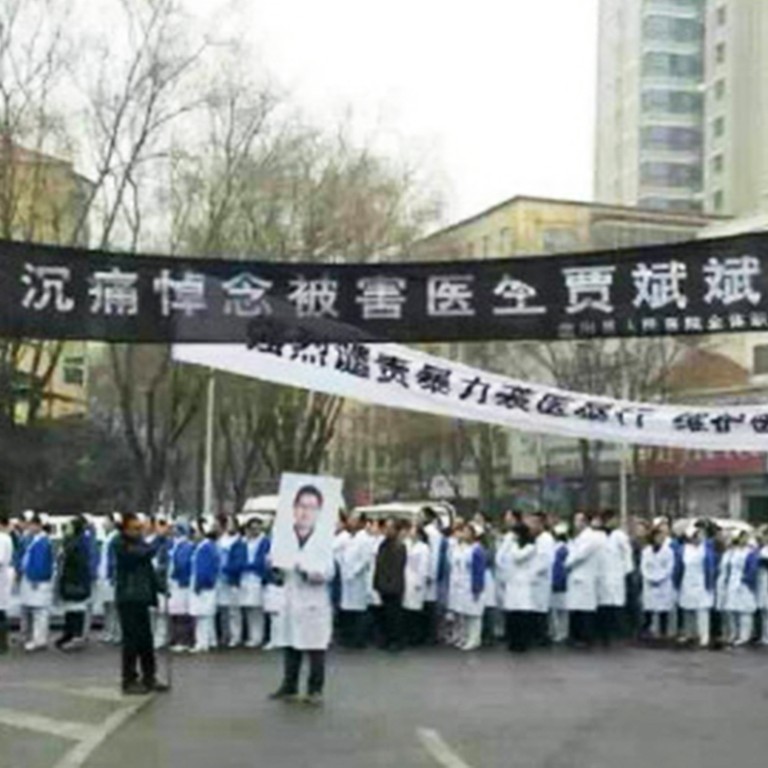
Chinese doctor, drunken patient plunge to death in elevator shaft in latest attack on medical staff
Staff at a local hospital in central China took to the streets on Sunday to mourn the death of their colleague, an orthopaedic surgeon who was killed during a row with a drunken patient at the weekend.
Staff at a local hospital in central China took to the streets on Sunday to mourn the death of their colleague, an orthopaedic surgeon who was killed during a row with a drunken patient at the weekend.
Photos circulating on Weibo show a long queue of doctors and nurses in work clothes marching in the streets of Luanchuan with banners that read “Mourn the murdered doctor, Jia Binbin” and “[We] strongly condemn violent attacks on doctors and [demand] the lives of medical staff be protected. “
One banner was signed by “the staff of the People’s Hospital in Luanchuan county,” a local hospital in Henan province where Jia worked as an orthopedic surgeon, before being killed in and accident during the early hours of Saturday morning.
Police said Jia was on duty at the hospital’s orthopaedics department on Saturday when a man named Zhang Yanlong, accompanied by his cousin Li Yulong, arrived for treatment for a broken leg.
A fight broke out between Jia and Li around midnight after Jia went over to warn Li, who was verbally abusing a nurse, not to disturb the other patients.
According to the Jia received four or five heavy blows to the head during the ensuing argument with Li and had to fight back to defend himself.
“[Li] started [the fight]. I checked the CCTV footage," Wang Shuo, director of the hospital’s general office was quoted as saying.
During the tussle, the two men slammed into a lift door, which was thrown open, and both men fell from the 15th floor to the first floor, where the lift was stationary.

The police report mentioned that Li and Zhang had been drinking with friends before Zhang broke his leg and was taken to hospital. The newspaper quoted Wang as saying that six drunken men initially came to the hospital, including two cousins.
“They had already been arguing for a while in the emergency department,” Wang said.
Wang also said that Li’s family had later gone to the hospital to demand compensation for their son’s death.
Zhang Yanlong said that he and his cousin saw no one at the inpatient service and yelled at nurses after waiting for a long time, the reported.
Police said they would be looking further into this case.
Jia’s death and photos of the protest triggered a furious reaction from doctors online, who have increasingly been on the receiving end of often deadly violence in recent years and find hospitals no longer safe to work in.
“Is this a dispute or a violent attack on doctors?” asked Zhang Xiaodong, asked director of the gastroenterology department at Beijing Caner Hospital, on her microblog.
“The doctor was beaten and pushed into the lift shaft by a drunken relative of patient. He fell to his death … and the family of the perpetrator is now demanding compensation from the hospital! “Sun Hongtao, a doctor at Beijing Fuwai Hospital, said on his microblog.
The average number of assaults on doctors in China surged to 27.3 per hospital in 2012, up from 20.6 in 2008, according to a survey by Chinese Hospital Association, and more than 17,000 violent incidents against hospitals and medical staff were recorded by China’s Ministry of Health in 2010, comparing to 10,000 in 2005.
In a widely publicised incident in 2012, a patient suffering from ankylosing spondylitis and tuberculosis killed an intern who had not been involved in his treatment and injured three more people with a knife after he thought he received a misdiagnosis from a hospital in northeastern Harbin.
The violence highlights a deepening unease between doctors and patients, with many doctors complaining about being overworked and underpaid, while patients often feel dissatisfied with the levels of service at hospitals and high costs due to insufficient government subsidies. Write quote

